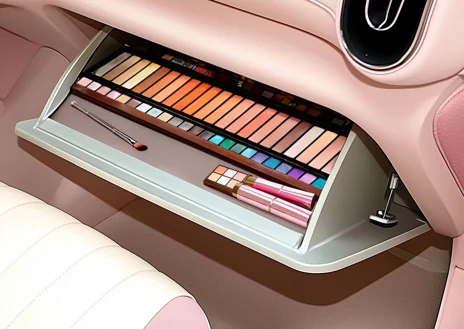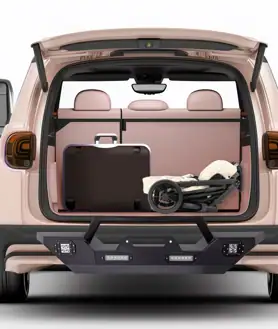75% of female drivers have experienced some type of gender discrimination on the road. Furthermore, almost 30% of Spaniards believe that a car should be designed specifically for women.
With these arguments and thanks to Artificial Intelligence (AI) is how CARmela was created, the 100% female car created from the data of a study, which reflects opinions on what a woman’s car should be like.
This is the #EllasDriven campaign, which celebrates its fifth anniversary with the help of Midas, which aims to give visibility to the limiting ideas that still exist regarding the capabilities of women behind the wheel and how paternalistic visions persist that underestimate their driving skill and confidence, as well as your knowledge of the engine.
CARmela’s characteristics
The study has revealed, through the vehicle that AI has generated from the extracted data, the preconceived ideas that exist about what a car “designed for women” should supposedly include.
Among the characteristics most selected by those surveyed who agree with the need to design a specific vehicle for women is that a female vehicle should have a higher level of safety (43%). This need for “additional protection” or anti-scratch systems is based on the assumption that women have less ability or skill in driving.
Secondly, with an equivalent proportion (32%) in the set of selected characteristics, are the following. The first is that the car should include soft materials and colors, more and larger mirrors, and pedals adapted to women’s shoes, reducing women’s interest in aesthetics. The second is that the car should be lighter and easier to drive, which suggests a biased view that assumes that women would need a vehicle that is less demanding to control. The third of them points out the tendency to associate women with a family role in the vehicle: the car would need to have additional space for baby seats. This characteristic responds to the biased belief that a woman’s car should be prepared for child transportation, assuming that female priorities in the vehicle revolve mainly around family care.
To a lesser extent, the idea was selected that a speed limiter would be useful to control driving (24.2%) and that a female vehicle should have a larger glove compartment to store personal items such as makeup (17.8%). This detail reflects a point of view that continues to limit women’s interests to aesthetic aspects.


Furthermore, the study shows that the idea that women’s cars should offer more power or louder engines had only 11.7% support, reflecting that the majority perceive women as less interested in car performance.
Discrimination in the motor world
“It is still surprising that, in the 21st century, inexplicable clichés persist about women and their relationship with driving and, even, with the need for women to have a car designed specifically for us,” says Jocelyne Bravo, Marketing and Communications Lead at Midas.
In Spain, 75% of female drivers have experienced some type of gender-based discrimination on the road, including gestures such as looks, comments, insults or honking, evidencing a hostile environment in which their presence and ability behind the wheel is questioned. . It is alarming that, of this group, almost 40% claim to suffer from these behaviors frequently or constantly, a recurrence that highlights a persistent gender problem.
The study also exposes how women face everyday discrimination in the automotive environment. 32% of them have experienced differential treatment in workshops, where it is still rare to see a woman managing maintenance issues; Furthermore, 22.4% say that the attention in dealerships tends to focus on their male companion. This discriminatory treatment not only perpetuates sexist ideas, but also affects the confidence and self-esteem of women, who 35.6% admit to feeling emotionally affected by sexist comments about their driving.
#CARmela #feminine #car #created #Artificial #Intelligence

